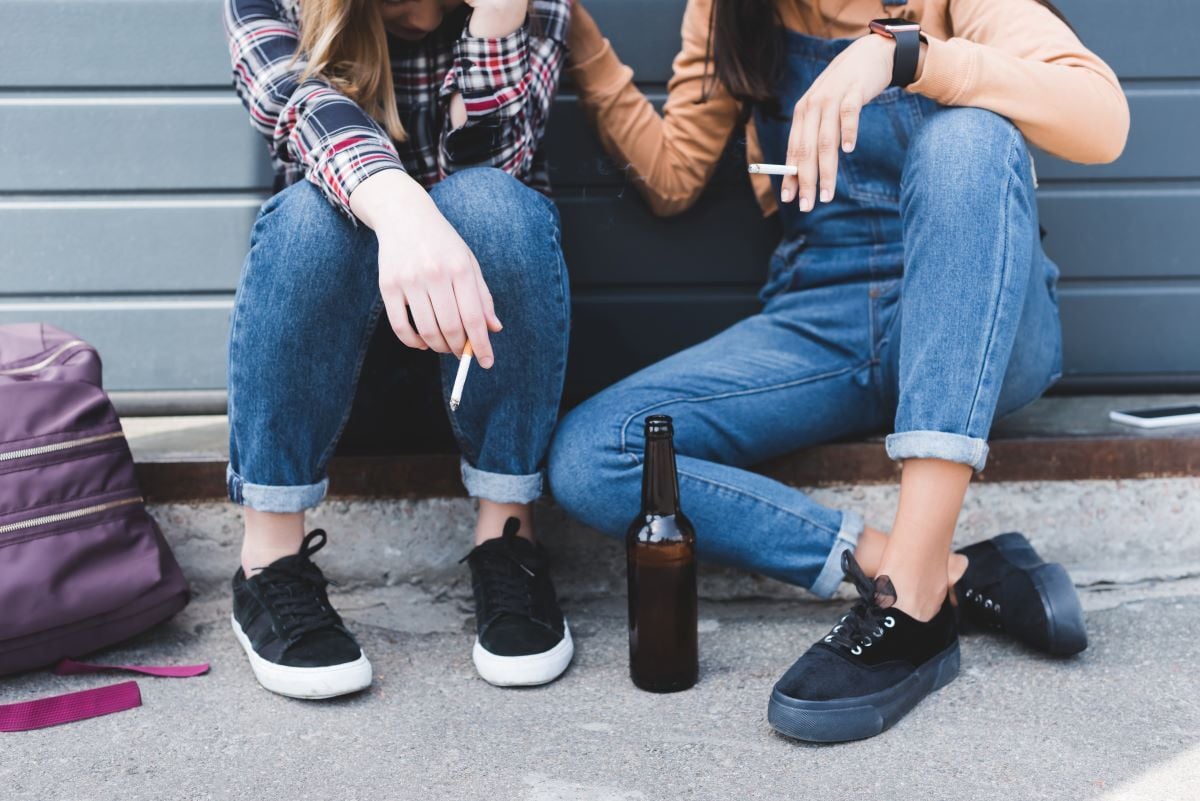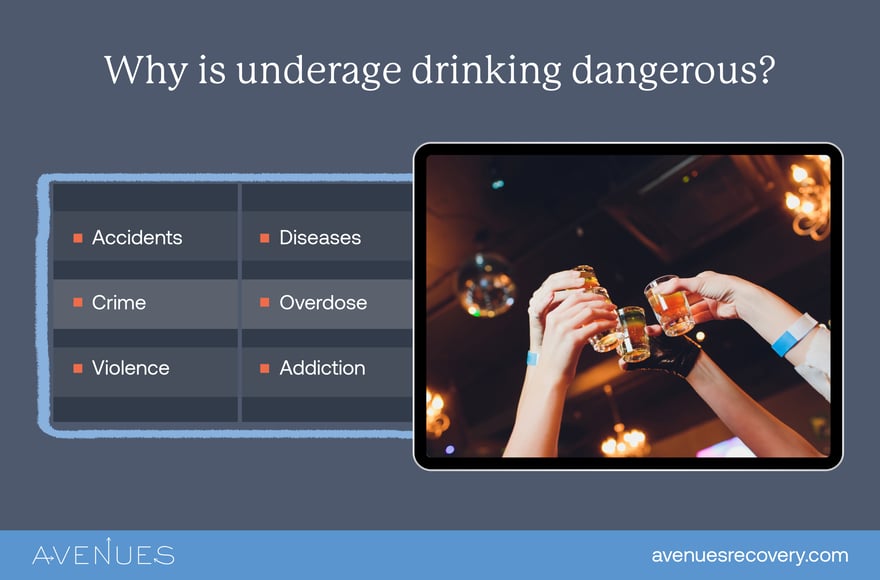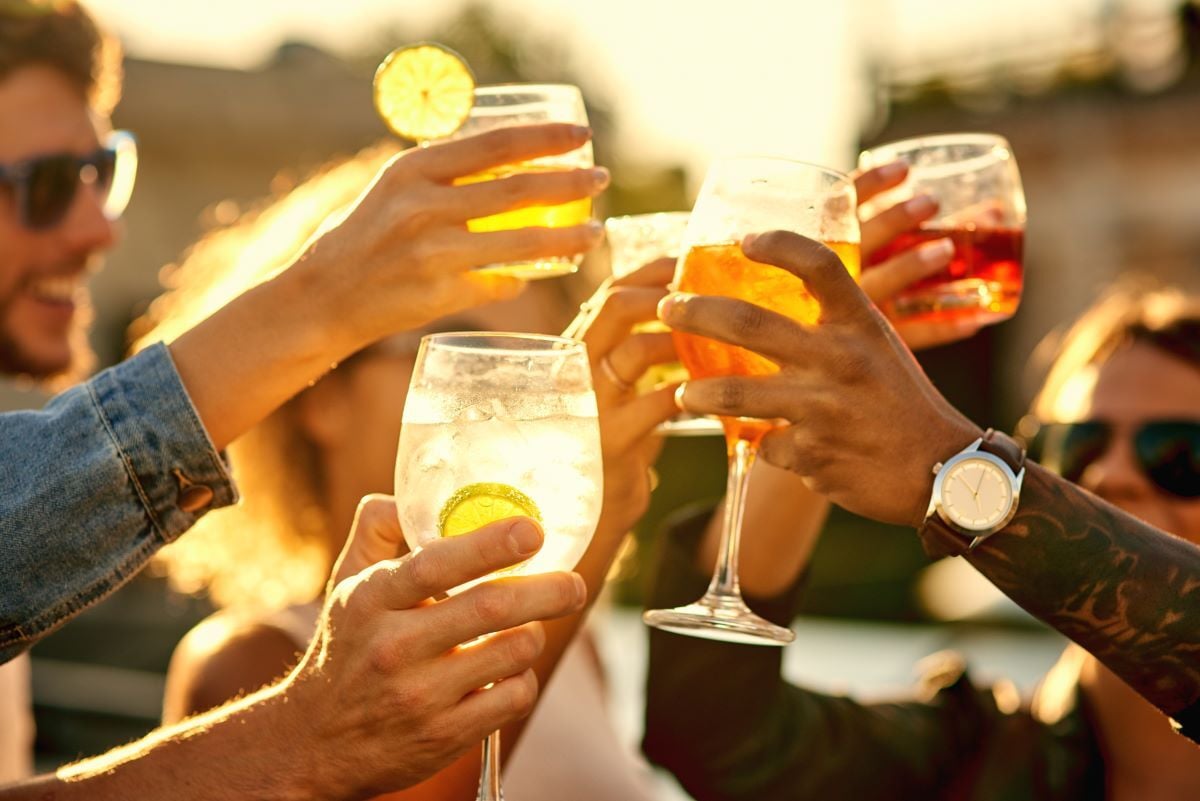Although state laws restrict the sale of alcohol to children under the age of 21, alcohol remains widely abused by children as young as 12, and holds the distinction of being the leading cause of addiction, overdose, disease, crime, violence, dangerous driving and other accidents.
For teenagers, drinking is closely tied to peer pressure. Many teens experience peer pressure of drinking, causing them to first try some alcohol, then become dependent on it, and finally become addicted. This article will explore the concept of peer pressure and alcohol, particularly in regard to teenagers.

Why is peer pressure with alcohol dangerous?
The problem of underage drinking is more prevalent than many people believe. According to the National Institute on Alcohol Abuse and Alcoholism (NIAAA), 5.6 million youth ages 12 to 20 reported drinking alcohol beyond “just a few sips” in one month (2023). In a 2023 National Survey on Drug Use and Health (NSDUH), it was discovered that youth aged 12-20 use alcohol more than tobacco products, nicotine vapes, and marijuana!
Children who feel pressured to try alcohol at a young age are at risk of several short- and long-term negative effects. According to the National Library of Medicine, alcohol consumption can lead to a one-time event like a car accident, or in the long-term, poor school performance, relationship issues, and drug or alcohol addiction in the teen years or beyond.
The Centers for Disease Control and Prevention (CDC) claim that teenagers who drink before they hit 15 are around 6 times more likely to develop an addiction later in life, as opposed to those who wait until they are 21.

What causes peer pressure drinking in teenagers?
There are many causes of peer pressure drinking amongst teenagers. Adolescents’ brains are not fully developed, and the hormonal changes that occur during this period can contribute to them taking risks, being impulsive, and looking for a quick fix to make them feel better.

Many teenagers feel like they need to ‘fit in’ to have friends, and drinking may be a way to socialize and nurture friendships. This is especially true when alcohol is consumed during parties or other events. Alcohol is also often seen as a ‘grown-up’ beverage, causing teens to be tempted to try it and appear macho or mature.
The adolescent years are turbulent for every teen, and they are more inclined to take advice or cues from their peers rather than the adults in their lives. This means that if their friends are using alcohol, they will likely try it out, too. This underscores the importance of teens finding mentally and emotionally healthy friends during the formative teenage years.

Types of peer pressure with drinking:
Peer pressure amongst teenagers isn’t as overt or obvious as you may think. Sometimes, teenagers are openly encouraged by their friends to drink, are mocked if they don’t drink, or are given a bottle that a friend brought for them, with the obvious understanding that they would drink.
However, peer pressure can be more subtle than that. Teens may feel a pressure to drink so they can ‘fit in’ and be part of a group of friends. They absorb the subtle message that all the girls and guys in this group drink, and to be part of them, they have to drink, too. This can especially happen when the teens drinking alcohol are popular, cool, or the group that everyone wants to be a part of. This is also true for social media, where teenagers absorb what they see others do, and try to replicate it in their lives in an effort to fit in.
Teens may brag about how much they have drunk, even though the amount may be untrue. They do that for attention, to sound cool, and to make more friends. When their friends hear how much they’ve drunk, they may feel a pressure to do the same, which can cause naïve teens to drink more than is safe.
How can parents help teenagers experiencing peer pressure to drink?
The first step to helping your teenagers deal with peer pressure to drink is being aware of the issue. Don’t bury your head in the sand and convince yourself that your child won’t succumb. It is normal for teens to want to fit in with their peers and if their friends are playing around with alcohol, your child is at risk of joining them.
It’s also very important to have an open, warm line of communication with your child. Discuss your concerns regarding alcohol. Educate your teen so they understand the dangers of underage drinking- both the short and long term effects. Invite your child to share their feelings, fears, and difficulties.
Explain to your child that alcohol may help you forget about your issues in the short term, but in reality, the issues don’t disappear. Rather, drinking alcohol puts you at risk of a much larger, long-term issue of alcohol addiction, in addition to any problems you have at the present. Be calm, supportive, and encouraging, while allowing your teen to share their thoughts, too.

Tips to manage peer pressure drinking:
Here are some ideas to help your teenagers deal with peer pressure to drink:
- Encourage them to blame their parents for not wanting to drink. They can say their parents will be angry and get them into big trouble if they smell any alcohol or suspect they’ve been using it at all.
- Help your teen make smart social choices. The popular guys and girls may be more cool or fun, but having to deal with peer pressure to drink as a result of a friendship may not be worth the effort the relationship demands.
- Be aware that many teens will pretend to drink more than they actually do. Don’t get caught up in their graphic descriptions of how much they drank, how it felt, or how much they plan to drink.
- Educate your teens and encourage them to look up the facts whenever they’re struggling. Seeing the sobering statistics may frighten them sufficiently so they can overcome the external pressure to drink.
- Allow your teens to reward themselves if they attended a party or social event and didn’t drink. Planning in advance not to drink and thinking about an exciting reward in exchange may motivate them not to drink.
- Have them team up with another sensible friend so they can hold each other accountable not to drink, regardless of the peer pressure. If two or more well-liked friends make this pact, they may even start a new no-drinking trend!
Alcohol addiction treatment:
Alcohol addiction is a chronic, progressive, relapsing disorder that is not cured with medication, willpower, or therapy. If you or a loved one is addicted to alcohol, you need intensive care to help you wean off the alcohol safely, and a short and long-term plan for recovery.
At Avenues Recovery Center, we understand how difficult it is to stop drinking alcohol once you’re addicted. Through our various rehab locations nationwide, we’ve helped thousands of people through medical detox and full recovery. Our professional staff offer many therapeutic modalities, one-on-one ang group therapies, 12-step meetings, and more, to help you start your journey to recovery. Reach out today to start!


